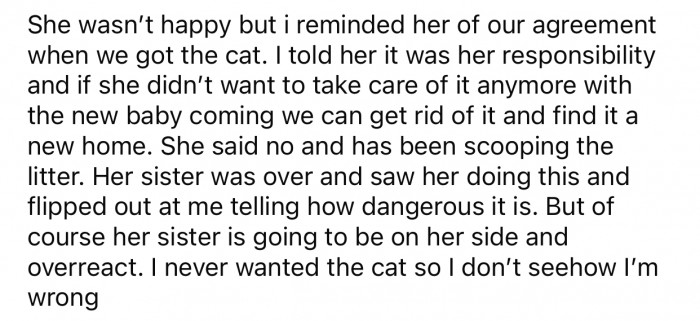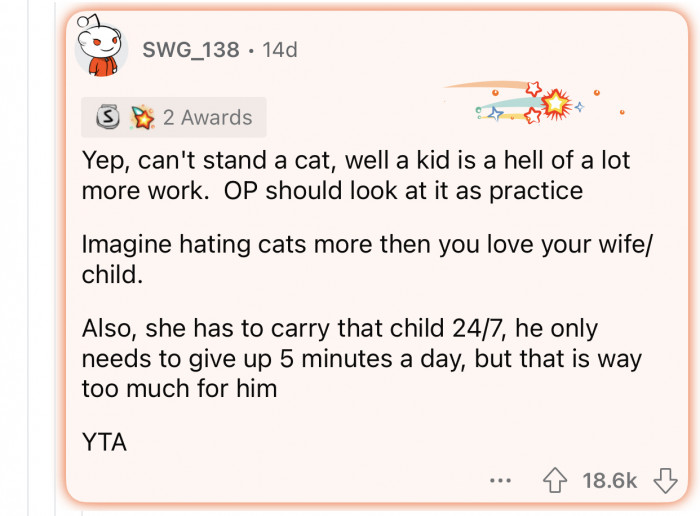Man Refuses To Briefly Take On The Task Of Scooping The Cat Litter Until His Wife Gives Birth Because For Him It Is A Matter Of Principles
You've probably heard before that pregnant women should avoid coming into contact with cats and their litter to evade birth abnormalities. In fact, cats do indeed expel a parasite called Toxoplasmosis in their feces that can harm a fetus.
However, the parasite can be contracted in other ways, not just through contact with cats. Expectant mothers don't need to shoo away cats for fear of affecting their babies' health since there are many ways to prevent this parasite from infecting a fetus.
Pregnant women should avoid cleaning the cat's litter box because it could expose them to the parasite. The fetus can be at risk for serious complications if the parasite manages to infiltrate the woman's body.
A Redditor who goes by the username u/mozzz22 made a post on the r/AmItheA**hole subReddit where he explained how he refused to scoop the litter box for his pregnant wife, despite her worries about Toxoplasmosis. The user tried to justify his decision in the post, and the Reddit community had a lot of different reactions to his unwillingness to help his pregnant wife.
Scroll down to check out the full Reddit post, and scroll a little further to read the comments from the original post.
Here's the original post by Reddit user u/mozzz22:

OP "looked it up" on the internet and concluded that he doesn't have to help his pregnant wife.

OP never wanted to have a cat and feels he's in the right for behaving that way.

Understanding Gender Dynamics in Household Responsibilities
The reluctance of one partner to engage in household chores during a partner's pregnancy often reflects deeper societal and relational dynamics. Research indicates that traditional gender roles can significantly influence how responsibilities are shared in couples, particularly during significant life transitions such as pregnancy. Studies published in the Journal of Family Psychology show that men may feel societal pressure to uphold a certain masculinity that discourages them from performing tasks perceived as "women's work," which can lead to conflict in partnerships.
Dr. Tanya L. Chartrand from Duke University emphasizes that these ingrained beliefs can create stress and feelings of inadequacy in both partners. The disparity in shared responsibilities can negatively affect relational satisfaction and lead to resentment, particularly if one partner perceives the other's refusal as a lack of support during a crucial time.
Understanding Gender Roles
Dr. James Carter, a gender studies expert, explains that traditional gender roles often dictate household responsibilities. These roles can create tension when one partner feels that their contributions are not recognized or valued.
Research from the Journal of Marriage and Family indicates that rigid gender expectations can lead to dissatisfaction in relationships.
Here's how the Reddit community reacted to u/mozzz22's post:

Even if OP never wanted the cat, he should make sure nothing bad happens to his baby.

If you care about the health and safety of your family, scooping the litter box is the least you could do.

From a psychological perspective, the issue of household task distribution can also be examined through the lens of cognitive dissonance. When one partner refuses to take on a task that they have the capability to perform, it may create a sense of internal conflict, as they navigate their principles against the needs of their partner. This phenomenon is supported by research in behavioral psychology, which suggests that individuals seek consistency between their beliefs and actions to minimize discomfort.
As noted in studies by cognitive psychologists, a person might rationalize their behavior by emphasizing the importance of their principles, but this can lead to further interpersonal strain if not addressed effectively.
Studies show that couples who negotiate household responsibilities openly are more likely to report higher levels of satisfaction. This highlights the importance of communication in managing expectations around chores and responsibilities.
Understanding these dynamics can help couples find a balance that works for both partners.
"Why be married to someone you care so little about."

The quality of her life could seriously get reduced because of it.

"Cats and other pets and walking red flags."

The Role of Communication in Relationship Dynamics
Effective communication is paramount in relationships, especially during demanding periods like pregnancy. Conflict resolution research indicates that couples who engage in open dialogue about their needs and expectations are more likely to develop strategies that work for both partners. Dr. John Gottman, a renowned relationship expert, emphasizes that 'the way couples communicate can either build a bridge or create a wall' in their relationships.
Conversations about shared responsibilities can help alleviate tension and foster a cooperative spirit, which is essential for both partners' emotional well-being during pregnancy. The use of 'I' statements, where individuals express their feelings without blaming the other, can facilitate a healthier exchange of ideas and promote mutual understanding.
The Role of Emotional Labor
Emotional labor refers to the management of feelings to fulfill the emotional needs of others. A psychologist notes that this type of labor often falls disproportionately on one partner, leading to feelings of resentment.
Research shows that emotional labor can lead to burnout, particularly when it is unrecognized or undervalued.
OP hates cats more than he loves his wife.

Googling things is obviously superior to anything else.

This would be the next logical step for someone of this mindset.

Another critical aspect to consider is the psychological impact of shared responsibilities on pregnancy health outcomes. Research has shown that stress during pregnancy can lead to negative health effects not only for the mother but also for the developing fetus. A study published in the Journal of Reproductive Health found that pregnant women who felt supported by their partners experienced lower levels of stress and anxiety, contributing to healthier pregnancy outcomes.
Thus, couples should prioritize discussing household tasks in a manner that emphasizes partnership and support, potentially incorporating strategies such as shared calendars or chore assignments that acknowledge both partners' contributions.
To address these issues, couples can benefit from creating a shared understanding of emotional and physical responsibilities. Regular check-ins can help partners express their feelings about household tasks and emotional labor.
Studies indicate that couples who engage in these discussions report improved emotional intimacy and satisfaction.
OP's decision is selfish and shows how little he cares.

It doesn't seem like OP would admit to being wrong.

It's not worth taking the risk.

Cultural Influences on Parenting Roles
Cultural expectations can significantly shape how couples approach parenting and household duties. In many cultures, traditional gender roles dictate that women should handle domestic responsibilities, while men focus on providing financially. This cultural lens can create friction when one partner, particularly the expecting mother, seeks assistance during pregnancy.
According to research from the American Psychological Association, these ingrained norms can lead to feelings of inadequacy or resentment when expectations are not met. Couples may benefit from exploring their cultural backgrounds and discussing how these influences intersect with their personal values and relationship dynamics.
Exploring the Impact of Stress
Stress during pregnancy can significantly impact both partners. Research from the American Journal of Obstetrics and Gynecology shows that high-stress levels can affect relationship dynamics, leading to increased conflict.
Understanding the relationship between stress and conflict can help couples navigate these challenging times more effectively.
"Your wife is kinder than you are, because I wouldn’t be if you were my husband."

It doesn't always lead to death, but why risk it?

Changing diapers is much worse than scooping the cat litter box.

Practical solutions can be derived from understanding the psychological principles at play in this scenario. Couples can benefit from establishing a shared understanding of household roles before the arrival of the baby, which can minimize stress and conflict. A study published in the Journal of Family Psychology suggests that preemptive discussions about task sharing can lead to more equitable divisions of labor, promoting a sense of teamwork and collaboration.
Furthermore, therapists often recommend setting up regular check-ins to discuss feelings about household responsibilities and any adjustments needed as the family dynamic changes.
Encouraging stress-reduction techniques, such as mindfulness or couples therapy, can enhance relationship quality during stressful periods. Research supports that couples who practice mindfulness together report greater relationship satisfaction.
By fostering a supportive environment, couples can better manage stress and strengthen their bond.
It's something you would do for a complete stranger.

OP is being immature by taking this stance.

It's not that hard to be a good husband.

The Importance of Empathy in Relationships
Empathy plays a crucial role in navigating the complexities of relationship dynamics during pregnancy. Understanding your partner's feelings and perspectives can pave the way for constructive conversations about responsibilities. Research in emotional intelligence indicates that partners who practice empathy are more likely to foster supportive environments that can lead to positive health outcomes during pregnancy.
Dr. Brené Brown, a leading researcher on vulnerability and empathy, points out that 'vulnerability is the birthplace of innovation, creativity, and change.' In this context, acknowledging one's shortcomings and being open to dialogue can significantly enhance relational satisfaction and connection.
Well, this was quite a story. OP should reconsider his decision and be mature for once.
He's putting his baby's health at risk by acting this way; it's not a risk worth taking. If you enjoyed reading this, make sure to check out similar content on our platform.
Expert Opinion
This situation illustrates how traditional expectations can create stress and conflict in relationships. It’s crucial for partners to discuss their needs openly and work collaboratively towards shared responsibilities.
Analysis & Alternative Approaches
Understanding the complexities of household responsibilities reveals the impact of traditional gender roles on relationships. According to the American Psychological Association, open communication is essential for navigating these challenges.
By establishing clear responsibilities and supporting each other emotionally, couples can enhance their relationship quality.
Therapeutic Insights & Recovery
In summary, the interplay of gender dynamics, cultural influences, and effective communication in household responsibilities during pregnancy can significantly impact relationship satisfaction and health outcomes. Understanding these psychological principles allows couples to navigate these challenges more effectively. As supported by research, open dialogue, empathy, and shared responsibility can lead to healthier relationships, ultimately benefiting both partners and the child. By fostering a cooperative environment and addressing underlying tensions, couples can create a supportive foundation that honors both individual and collective needs.




